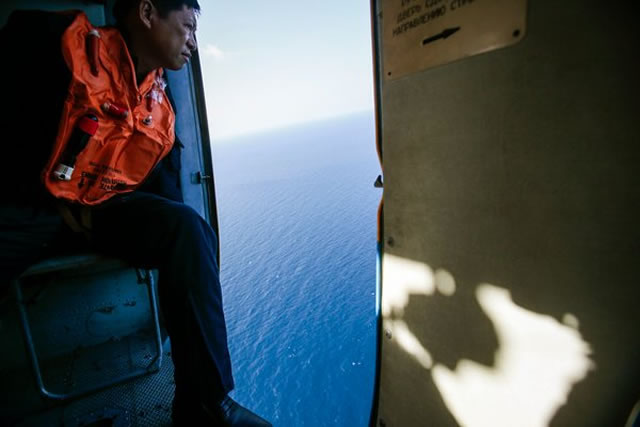LATEST on Malaysia Airlines MH370: Australia checks 2 objects in remote ocean

 Australia has sent four aircraft and a navy ship to an area in the southern Indian Ocean to determine whether two large floating objects spotted by satellite are pieces of wreckage from a Malaysian jet missing for nearly two weeks.
Australia has sent four aircraft and a navy ship to an area in the southern Indian Ocean to determine whether two large floating objects spotted by satellite are pieces of wreckage from a Malaysian jet missing for nearly two weeks.
No certain wreckage from Malaysia Airlines Flight MH370 has been found since it disappeared on March 8, sparking one of the largest search efforts in aviation history and raising questions about what happened to the plane carrying 239 people.
“It is credible enough to divert the research to this area on the basis it provides a promising lead to what might be wreckage from the debris field,” said Air Commodore John McGarry of Australia’s Department of Defence at a news conference.
Satellite imagery analyzed by experts discovered two objects of a “reasonable size” bobbing up and down in the southern Indian Ocean, said John Young, general manager of Australia’s Maritime Safety Authority. The objects were spotted about 2,500 kilometres southwest of Perth, in an area where the ocean is about 3,000 metres deep.
The largest object appears to be about 24 metres, he said — with the second object being smaller at about five metres. A number of smaller items appear to be scattered around the large object, he said.
“This is a lead. It is probably the best lead we have right now. But we need to get there, find them, see them, assess them to know whether it’s really meaningful or not,” he said.
The search for the objects could take time. Australian authorities said one of the planes was unable to locate the debris through clouds and rain, but that other planes would continue the hunt.
CBC meteorologist Jay Scotland said early Thursday that the weather in the area was improving over the next few hours, and he expected clear skies for 24 hours and possibly more.
An unprecedented multinational search for the plane has focused on two vast search corridors: one arcing north overland from Laos towards the Caspian Sea, the other curving south across the Indian Ocean from west of Indonesia’s Sumatra island to west of Australia.
Malaysian Transport Minister Hishammuddin Hussein said the larger, established search will continue even the Australian images are investigated.
Military planes from Australia, the U.S. and New Zealand have been searching in a region over the southern Indian Ocean that was narrowed down from 600,000 square kilometres to 305,000 square kilometres.
Two ships are on their way to the search for the potential debris, which is south of where the search has been focused since Monday. A merchant ship, which responded to a rescue co-ordination centre call, was expected to arrive later Thursday, while a Royal Australian Navy ship, which is well-equipped for recovering objects, is still days away from the area.
“The most likely scenario is that an aircraft will find an object, if it is findable, and then report back an accurate GPS position,” Young said. “And AMSA would task the ship to proceed to the area and attempt to see it.
“That would be our first chance to get a close up look of whatever the objects might be and progressively advance the identification of whether they’re associated with the search or not.”
Young warned that satellite images “do not always turn out to be related to the search even if they look good, so we will hold our views on that until they are sighted close-up.”
Australian Prime Minister Tony Abbott earlier told Parliament about the debris.
Young said commercial satellites had been redirected in the hope of getting higher resolution images. He did not say when that would happen. The current images are not sharp enough to determine any markings.
The images were taken March 16, but Australian Air Commodore John McGarry said it took time to analyze them.
Finding floating wreckage is possible
David Gallo, the U.S. project leader in the search for a missing Air France flight in 2009, said based on the descriptions provided by officials of two larger objects surrounded by multiple smaller objects, the discovery is sounding increasingly like a debris field.
While debris would typically scatter, he said ocean experts who study wind and waves have told him there is a pocket in the search area that has been fairly calm over the past few days, making it possible for the debris to have stuck closer together.
Based on the size described, Gallo predicts it could turn out to be a piece of the plane’s wing or fuselage, which is the main body of an aircraft.
“It sounds like the plane was landed fairly gently,” said Gallo, assuming the objects are identified as wreckage from flight MH370. “It wasn’t nose-dived into the surface of the ocean, if it is in fact the plane.”
In the search for Air France Flight 447, the tail fin was near the first thing found, he said, about five days after it crashed. Over the next week or two, crews recovered more pieces and some human remains.
Gallo said the ocean is mysterious and it’s hard to predict when survivors will be found.
“We won’t know that until we know.”
Other experts told CBC News the objects may end up being containers that fell from cargo ships.
John Blaxland, a senior fellow at the Strategic and Defence Studies Centre at Australian National University, said he suspects it’s a container and that it will be hard to find no matter what it is.
“The photo is four days old, and that means the currents would have moved this object, possibly quite a long ways, and not only that, it may have submerged further.”
Families hold out hope
The families of the passengers and crew on board the missing flight appear to be holding out hope that this will either fail to be wreckage or survivors will be found, CBC News reporter Andrew Lee said from a hotel in Beijing where many of the families are staying.
Lee said he spoke to one man, who was aware of the satellite imagery, who said he believes his son is still alive and won’t believe otherwise unless he sees a body. The father said families have had to cope with a great deal of misinformation, making it difficult to believe this new development.
Lee said families in the hotel are on “razor-thin edge to begin with” and emotions ran high after they were briefed on the possible findings.
People rushed out of the briefing room, many with their heads down and tears on their faces, he said.
Investigators believe that someone with detailed knowledge of both the Boeing 777-200ER and commercial aviation navigation switched off the plane’s communications systems before diverting it thousands of kilometres off its scheduled course from Kuala Lumpur to Beijing.
Exhaustive background checks of the passengers and crew aboard have not yielded anything that might explain why.
The FBI is helping Malaysian authorities analyze data from a flight simulator belonging to the captain of the missing plane, after initial examination showed some data logs had been deleted early last month. Hishammuddin said he had no new information on efforts to recover those files.










Comments